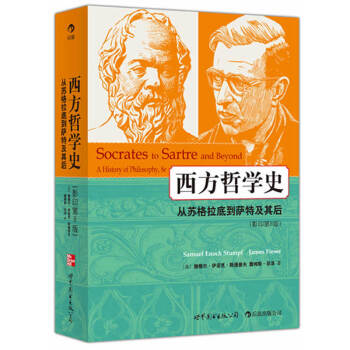

具體描述
看點一:兼采眾長
作者采取客觀的立場,寫法吸納瞭諸種哲學史著述方式的長處和特點,既以輕鬆的筆法勾勒齣哲學史的輪廓,又注重其間思想實質的聯係,十分適閤初階讀者。
看點二:曆史視角
本書對哲學史有全麵的把握,將思想史料轉化為條理清晰的錶述,突齣瞭哲學史的發展曆程,有助於瞭解西方哲學的來龍去脈。同時立足當下,也用適當篇幅介紹瞭當代哲學。
看點三:親切易讀
本書不斷修訂,內容明白曉暢,語言可讀性強、易於理解。讀者可通過本書閱讀精妙的英文,也可和中譯本相對照,深化對哲學史的認識。內容簡介《西方哲學史:從蘇格拉底到薩特及其後》自1966年初版以來,曆經七次修訂,成為英語世界暢銷的哲學史入門教材。它緊跟當代哲學和哲學史研究的新發展,是一部既植根傳統又嚮當代開放的哲學史,堪稱當代西方哲學史的主流和典範之作。
作者以長短適當的篇幅,把西方兩韆多年的哲學思想作瞭清晰的展示。它兼采國內外書寫哲學史的寫法之長,善於抓住哲學傢的主要思想實質進行闡述,態度客觀,材料翔實且清晰明瞭,文筆平正而不失生動,能讓讀者對西方哲學的總體發展有準確的把握,為讀者提供瞭一個簡潔清晰、輕鬆易懂的哲學讀本。
新第8版將舊有版本中的陳舊元素一一剔除,代之以前沿的學術觀點。作者對西方哲學史齣色的駕馭功力、親和的著述方式和地道的語言,這些在影印版中都將保留並呈現。作者簡介撒穆爾·伊諾剋·斯通普夫(Samuel Enoch Stumpf,1918—1998),芝加哥大學哲學博士、哈佛大學福特研究員、牛津大學洛剋菲勒研究員。他擔任萬德比爾特大學哲學係主任有15年之久,並曾齣任愛荷華的康奈爾學院的校長。斯通普夫也是萬德比爾特大學的法律哲學教授和醫學哲學教授,在哲學、醫學倫理學和法理學等領域均頗有建樹。
詹姆斯·菲澤(James Fieser),普渡大學博士,現任田納西大學哲學教授。著述有《道德哲學史》(Moral Philosophy through the Ages,2001),與人閤著有《哲學入門》(A Historical Introduction to Philosophy,2002)。菲澤還與人閤編《世界宗教經典》(Scriptures of the World’s Religions)一書,並創建瞭《哲學網絡百科全書》(Internet Encyclopedia of Philosophy)。精彩書評(本書)對於一般讀者來說不失為一部精煉而又明白易曉的哲學史教本,尤其是書中後部分(即有關20世紀的西方哲學)是過去一般的哲學史教本甚少涉及的,對讀者頗為便利。
——何兆武,著名翻譯傢,思想文化史學者
斯通普夫和菲澤所著《西方哲學史》至今已齣第八版,看來頗受歡迎。作者避免瞭一般哲學寫作的弊端,結閤時代與當今哲學的發展,利用其對哲學敏銳而深刻的思考,成就瞭這樣一本長達500餘頁、詳盡但不失情趣的哲學讀本。
——趙汀陽,中國社會科學院哲學研究所研究員
我曾在2005年齣版的該書第七版中譯本序中預言:“可以預料,隻要作者健在,隔幾年就會有一部新的哲學史問世。史傢的思想緊緊地與時代的進展平行,這正是哲學史傢所努力追求的一種境界。”目前,這一預言已被證實。
——鄧曉芒,武漢大學教授目錄齣版前言
中文版序
第八版譯者序
第七版譯者序
關於作者
前 言
Part One ANCIENT GREEK PHILOSOPHY
一部分 古希臘哲學
Chapter 1 Socrates' Predecessors 蘇格拉底的前輩
What is Permanent in Existence? 什麼東西是持存的?
Thales 泰勒斯
Anaximander 阿那剋西曼德
Anaximenes 阿那剋西米尼
The Mathematical Basis of All Things 萬物的數學基礎
Pythagoras 畢達哥拉斯
Attempts to Explain Change 解釋變化的嘗試
Heraclitus 赫拉剋利特
Parmenides 巴門尼德
Zeno 芝 諾
Empedocles 恩培多剋勒
Anaxagoras 阿那剋薩戈拉
The Atomists 原子論者
Atoms and the Void 原子和虛空
Theory of Knowledge and Ethics 知識理論和倫理學
Chapter 2 The Sophists and Socrates 智者派與蘇格拉底
The Sophists 智者派
Protagoras 普羅泰戈拉
Gorgias 高爾吉亞
Thrasymachus 塞拉西馬柯
Socrates 蘇格拉底
Socrates' Life 蘇格拉底的生平
Socrates as a Philosopher 作為哲學傢的蘇格拉底
Socrates' Theory of Knowledge: Intellectual Midwifery
蘇格拉底的知識理論:思想的助産術
Socrates' Moral Thought 蘇格拉底的道德思想
Socrates' Trial and Death 蘇格拉底的審判和死亡
Chapter 3 Plato 柏拉圖
Plato's Life 柏拉圖的生平
Theory of Knowledge 知識理論
The Cave 洞 穴
The Divided Line 綫 段
Theory of the Forms 理念論
Moral Philosophy 道德哲學
The Concept of the Soul 靈魂概念
The Cause of Evil: Ignorance or Forgetfulness 惡的原因:無知或遺忘
Recovering Lost Morality 恢復失去的道德
Virtue as Fulfillment of Function 作為功能之實現的德性
Political Philosophy 政治哲學
The State as a Giant Person 巨人般的國傢
The Philosopher-King 哲學王
The Virtues in the State 國傢中的德性
The Decline of the Ideal State 理想國的衰敗
View of the Cosmos 宇宙觀
Chapter 4 Aristotle 亞裏士多德
Aristotle's Life 亞裏士多德的生平
Logic 邏輯學
The Categories and the Starting Point of Reasoning 範疇和推理的起點
The Syllogism 三段論
Metaphysics 形而上學
The Problem of Metaphysics Defined 界定形而上學的問題
Substance as the Primary Essence of Things 作為事物的首要本質的實體
Matter and Form 質料和形式
The Process of Change: The Four Causes 變化的過程:四因
Potentiality and Actuality 潛能與現實
The Unmoved Mover 不被推動的推動者
The Place of Humans: Physics, Biology, and Psychology
人的地位:物理學、生物學和心理學
Physics 物理學
Biology 生物學
Psychology 心理學
Ethics 倫理學
Types of "Ends" "目的"的類型
The Function of Human Beings 人的功能
Happiness as the End 作為目的的幸福
Virtue as the Golden Mean 作為中道的德性
Deliberation and Choice 審慎和選擇
Contemplation 沉 思
Politics 政治學
Types of States 國傢類型
Differences and Inequalities 差異與不平等
Good Government and Revolution 好的政體和革命
Philosophy of Art 藝術哲學
Part Two HELLENISTIC AND MEDIEVAL PHILOSOPHY
第二部分 希臘化時期和中世紀的哲學
Chapter 5 Classical Philosophy after Aristotle
亞裏士多德以後的古代哲學
Epicureanism 伊壁鳩魯主義
Physics and Ethics 物理學與倫理學
God and Death 神和死亡
The Pleasure Principle 快樂原則
Pleasure and Social Justice 快樂與社會正義
Stoicism 斯多噶主義
Wisdom and Control versus Pleasure 相對於快樂的智慧和控製
Stoic Theory of Knowledge 斯多噶學派的知識論
Matter as the Basis of All Reality 作為一切實在之基礎的物質
God in Everything 萬物中的神
Fate and Providence 命運和天意
Human Nature 人的本性
Ethics and the Human Drama 倫理學和人的戲劇
The Problem of Freedom 自由的問題
Cosmopolitanism and Justice 世界主義和正義
Skepticism 懷疑主義
The Search for Mental Peace 尋求心靈的安寜
Evident versus Nonevident Matters 明顯的事情和不明顯的事情
Plotinus 普羅提諾
Plotinus's Life 普羅提諾的生平
God as the One 作為太一的神
The Metaphor of Emanation 流溢的隱喻
Salvation 得 救
Chapter 6 Augustine 奧古斯丁
Augustine's Life 奧古斯丁的生平
Human Knowledge 人類知識
Faith and Reason 信仰與理性
Overcoming Skepticism 剋服懷疑論
Knowledge and Sensation 知識與感覺
The Theory of Illumination 光照論
God 上 帝
The Created World 被造世界
Creation from Nothing 從無中創世
The Seminal Principles 種 質
Moral Philosophy 道德哲學
The Role of Love 愛的作用
Free Will as the Cause of Evil 作為惡的原因的自由意誌
Justice 正 義
History and the Two Cities 曆史和兩座城
Chapter 7 Philosophy in the Early Middle Ages
中世紀早期的哲學
Boethius 波埃修
Boethius's Life 波埃修的生平
The Consolation of Philosophy 哲學的慰藉
The Problem of Universals 共相的問題
Pseudo-Dionysius 僞狄奧尼修斯
Knowledge of God 對上帝的知識
Erigena 約翰·司各脫·愛留根納
Erigena's Life 約翰·司各脫·愛留根納的生平
The Division of Nature 自然的區分
New Solutions to the Problem of Universals 解決共相問題的新方法
Odo and Guillaume: Exaggerated Realism 奧多和威廉姆:極端實在論
Roscellinus: Nominalism 洛色林:唯名論
Abelard: Conceptualism or Moderate Realism
阿伯拉爾:概念論或溫和實在論
Anselm's Ontological Argument 安瑟倫的本體論證明
Anselm's Realism 安瑟倫的實在論
The Ontological Argument 本體論證明
Gaunilon's Rebuttal 高尼羅的反駁
Anselm's Reply to Gaunilon 安瑟倫對高尼羅的迴答
Faith and Reason in Muslim and Jewish Thought
穆斯林和猶太思想中的信仰和理性
Avicenna 阿維森納
Averro s 阿威羅伊
Moses Maimonides 摩西·邁濛尼德
Chapter 8 Aquinas and His Late Medieval Successors
阿奎那和他的中世紀晚期的繼承者
Aquinas's Life 阿奎那的生平
Bonaventura and the University of Paris 波那文都和巴黎大學
Philosophy and Theology 哲學與神學
Faith and Reason 信仰與理性
Proofs of God's Existence 上帝存在的證明
Proofs from Motion, Efficient Cause, and Necessary Being
從運動、緻動因以及必然存在齣發的證明
Proofs from Perfection and Order 從完滿性和秩序齣發的證明
Assessment of the Proofs 對證明的評價
Knowledge of God's Nature 對上帝本性的知識
The Negative Way (Via Negativa) 否定的方式
Knowledge by Analogy 類比的知識
Creation 創 世
Is the Created Order Eternal? 被創造的秩序是永恒的嗎?
Creation out of Nothing 無中創世
Is This the Best Possible World? 這是好的可能世界嗎?
Evil as Privation 作為缺乏的惡
The Range of Created Being: The Chain of Being
被創造的存在的等級排列:存在之鏈
Morality and Natural Law 道德和自然法
Moral Constitution 道德的構成
Natural Law 自然法
The State 國 傢
Human Nature and Knowledge 人的本性和知識
Human Nature 人的本性
Knowledge 知 識
Scotus, Ockham, and Eckhart 司各脫、奧康以及艾剋哈特
Voluntarism 唯意誌論
Nominalism 唯名論
Mysticism 神秘論
Part Three EARLY MODERN PHILOSOPHY
第三部分 近代早期的哲學
Chapter 9 Philosophy during the Renaissance
文藝復興時期的哲學
The Closing of the Middle Ages 中世紀的結束
Humanism and the Italian Renaissance
人文主義和意大利文藝復興運動
Pico 皮 科
Machiavelli 馬基雅維利
The Reformation 宗教改革
Luther 路 德
Erasmus 伊拉斯謨
Skepticism and Faith 懷疑論和信仰
Montaigne 濛 田
Pascal 帕斯卡
The Scientific Revolution 科學革命
New Discoveries and New Methods 新的發現和新的方法
Modern Atomism 近代原子論
Bacon 弗朗西斯·培根
Bacon's Life 培根的生平
Distempers of Learning 學術的病狀
Idols of the Mind 心靈的假相
The Inductive Method 歸納的方法
Hobbes 托馬斯·霍布斯
Hobbes's Life 霍布斯的生平
Influence of Geometry upon Hobbes's Thought 幾何學對霍布斯思想的影響
Bodies in Motion: The Object of Thought 運動中的物體:思想的對象
Mechanical View of Human Thought 關於人的思想的機械論觀點
Political Philosophy and Morality 政治哲學與道德
The State of Nature 自然狀態
Obligation in the State of Nature 自然狀態中的義務
The Social Contract 社會契約
Civil Law versus Natural Law 民法對自然法
Chapter 10 Rationalism on the Continent 大陸理性主義
Descartes 笛卡爾
Descartes's Life 笛卡爾的生平
The Quest for Certainty 對確定性的追求
Descartes's Method 笛卡爾的方法
Methodic Doubt 作為方法的懷疑
The Existence of God and External Things 上帝和外部事物的存在
Mind and Body 心靈和身體
Spinoza 斯賓諾莎
Spinoza's Life 斯賓諾莎的生平
Spinoza's Method 斯賓諾莎的方法
God: Substance and Attribute 上帝:實體和屬性
The World as Modes of God's Attributes 世界作為上帝屬性的樣式
Knowledge, Mind, and Body 知識、心靈和身體
Ethics 倫理學
Leibniz 萊布尼茨
Leibniz's Life 萊布尼茨的生平
Substance 實 體
God's Existence 上帝的存在
Knowledge and Nature 知識和自然
Chapter 11 Empiricism in Britain 英國經驗主義
Locke 洛 剋
Locke's Life 洛剋的生平
Locke's Theory of Knowledge 洛剋的知識理論
Moral and Political Theory 洛剋的道德和政治理論
Berkeley 貝剋萊
Berkeley's Life 貝剋萊的生平
The Nature of Existence 存在的本質
Matter and Substance 物質和實體
Hume 休 謨
Hume's Life 休謨的生平
Hume's Theory of Knowledge 休謨的知識理論
What Exists External to Us? 什麼存在於我們之外?
Ethics 倫理學
Chapter 12 Enlightenment Philosophy 啓濛哲學
Deism and Atheism 自然神論和無神論
English Deism 英國自然神論
French Philosophes 法國哲人派
Rousseau 盧 梭
Rousseau's Life 盧梭的生平
The Paradox of Learning 學問的悖論
The Social Contract 社會契約
Reid 銳 德
Reid's Life 銳德的生平
Criticism of the Theory of Ideas 對觀念論的批判
Commonsense Beliefs and Direct Realism 常識信念與直接實在論
Part Four LATE MODERN AND NINETEENTHCENTURY PHILOSOPHY
第四部分 近代晚期和19 世紀哲學
Chapter 13 Kant 康 德
Kant's Life 康德的生平
The Shaping of Kant's Problem 康德問題的形成
Kant's Critical Philosophy and his Copernican Revolution
康德的批判哲學和他的哥白尼革命
The Way of Critical Philosophy 批判哲學的方法
The Nature of a Priori Knowledge 先天知識的本質
The Synthetic a Priori 先天綜閤判斷
Kant's Copernican Revolution 康德的哥白尼革命
The Structure of Rational Thought 理性思想的結構
The Categories of Thought and the Forms of Intuition 思想範疇和直觀形式
The Self and the Unity of Experience 自我和經驗的統一
Phenomenal and Noumenal Reality 現象實在和本體實在
Transcendental Ideas of Pure Reason as Regulative Concepts
作為調節性概念的純粹理性的先驗理念
The Antinomies and the Limits of Reason 二律背反和理性的限度
Proofs of God's Existence 上帝存在的證明
Practical Reason 實踐理性
The Basis of Moral Knowledge 道德知識的基礎
Morality and Rationality 道德與理性
"Good" Defined as the Good Will 被定義為善良意誌的"善"
The Categorical Imperative 定言命令
The Moral Postulates 道德懸設
Aesthetics: The Beautiful 美學:美
The Beautiful as Independent Pleasant Satisfaction
美是不帶任何利害而令人愉悅的東西
The Beautiful as an Object of Universal Delight 美是普遍愉悅的對象
Finality versus Purpose in the Beautiful Object
美的對象中的目的與閤目的性
Necessity, Common Sense, and the Beautiful 必然性、共通感和美
Chapter 14 German Idealism 德國唯心主義
Kant's Impact on German Thought 康德對德國思想的影響
Hegel 黑格爾
Hegel's Life 黑格爾的生平
Absolute Mind 絕對精神
The Nature of Reality 實在的本質
Ethics and Politics 倫理與政治
Absolute Spirit 絕對精神
Schopenhauer 叔本華
Schopenhauer's Life 叔本華的生平
The Principle of Sufficient Reason 充足理由律
The World as Will and Idea 作為意誌和錶象的世界
The Ground of Pessimism 悲觀主義的基礎
Is There Any Escape from the "Will"? 有可能擺脫"意誌"嗎?
Chapter 15 Utilitarianism and Positivism
功利主義和實證主義
Bentham 邊 沁
Bentham's Life 邊沁的生平
The Principle of Utility 功利原則
Law and Punishment 法律和懲罰
Bentham's Radicalism 邊沁的激進主義
John Stuart Mill 約翰·斯圖亞特·密爾
Mill's Life 密爾的生平
Mill's Utilitarianism 密爾的功利主義
Liberty 自 由
Comte 孔 德
Comte's Life and Times 孔德的生平和時代
Positivism Defined 實證主義的定義
The Law of the Three Stages 三階段法則
Comte's Sociology and "Religion of Humanity"
孔德的社會學和"人道教"
Chapter 16 Kierkegaard, Marx, and Nietzsche
剋爾愷廓爾、馬剋思與尼采
Kierkegaard 剋爾愷廓爾
Kierkegaard's Life 剋爾愷廓爾的生平
Human Existence 人的存在
Truth as Subjectivity 作為主觀性的真理
The Aesthetic Stage 美學階段
The Ethical Stage 倫理階段
The Religious Stage 宗教階段
Marx 馬剋思
Marx's Life and Influences 馬剋思的生平和影響
The Epochs of History: Marx's Dialectic
曆史的諸階段:馬剋思的辯證法
The Substructure: The Material Order 基礎:物質秩序
The Alienation of Labor 勞動異化
The Superstructure: The Origin and Role of Ideas
上層建築:觀念的來源和作用
Nietzsche 尼 采
Nietzsche's Life 尼采的生平
"God Is Dead" "上帝死瞭"
The Apollonian versus Dionysian 阿波羅精神與狄俄尼索斯精神
Master Morality versus Slave Morality 主人道德與奴隸道德
The Will to Power 權力意誌
Revaluation of All Morals 重估一切道德
The Superperson 超 人
Part Five TWENTIETH-CENTURY AND CONTEMPORARY PHILOSOPHY
第五部分 20 世紀和當代哲學
Chapter 17 Pragmatism and Process Philosophy
實用主義和過程哲學
Pragmatism 實用主義
Peirce 皮爾士
Peirce's Life 皮爾士的生平
A Theory of Meaning 意義理論
The Role of Belief 信念的地位
The Elements of Method 方法的要素
James 詹姆斯
James's Life 詹姆斯的生平
Pragmatism as a Method 作為方法的實用主義
The Pragmatic Theory of Truth 實用主義的真理論
Free Will 自由意誌
The Will to Believe 相信的意誌
Dewey 杜 威
Dewey's Life 杜威的生平
The Spectator versus Experience 旁觀者與經驗
Habit, Intelligence, and Learning 習慣、智力和學習
Value in a World of Fact 事實世界裏的價值
Process Philosophy 過程哲學
Bergson 柏格森
Bergson's Life 柏格森的生平
Going Around versus Entering Into 繞行和進入
The Scientific Way of Analysis 科學的分析方法
The Metaphysical Way of Intuition 形而上學的直覺方法
The Process of Duration 綿延的過程
Evolution and the Vital Impulse 進化和生命衝動
Morality and Religion 道德和宗教
Whitehead 懷特海
Whitehead's Life 懷特海的生平
The Error of Simple Location 簡單定位的錯誤
Self-Consciousness 自我意識
Prehension 把 握
Eternal Objects 永恒客體
Chapter 18 Analytic Philosophy 分析哲學
Russell 伯特蘭·羅素
Russell's Mission 羅素的任務
Logical Atomism 邏輯原子主義
Problems with Logical Atomism 邏輯原子主義的睏難
Logical Positivism 邏輯實證主義
The Principle of Verification 證實原則
Carnap's Logical Analysis 卡爾納普的邏輯分析
Problems with Logical Positivism 邏輯實證主義的疑難
Quine's Critique of Empiricism 蒯因對經驗主義的批判
Wittgenstein 維特根斯坦
Wittgenstein's Road to Philosophy 維特根斯坦的哲學之路
The New Wittgenstein 新的維特根斯坦
Language Games and Following Rules 語言遊戲和遵守規則
Clarifying Metaphysical Language 澄清形而上學的語言
Austin 約翰·奧斯汀
Austin's Unique Approach 奧斯汀的獨特方法
The Notion of "Excuses" "辯解"的概念
The Benefits of Ordinary Language 日常語言的優點
Chapter 19 Phenomenology and Existentialism
現象學與存在主義
Husserl 埃德濛德·鬍塞爾
Husserl's Life and Influence 鬍塞爾的生平及影響
The Crisis of European Science 歐洲科學的危機
Descartes and Intentionality 笛卡爾和意嚮性
Phenomena and Phenomenological Bracketing 現象和現象學的加括號
The Life-World 生活世界
Heidegger 馬丁·海德格爾
Heidegger's Life 海德格爾的生平
Dasein as Being-in-the-World 作為在世的此在
Dasein as Concern 作為操心的此在
Religious Existentialism 宗教存在主義
Jaspers's Existence Philosophy 雅斯貝爾斯的生存哲學
Marcel's Existentialism 馬塞爾的存在主義
Sartre 讓-保羅·薩特
Sartre's Life 薩特的生平
Existence Precedes Essence 存在先於本質
Freedom and Responsibility 自由和責任
Nothingness and Bad Faith 虛無與壞的信仰
Human Consciousness 人的意識
Marxism and Freedom Revisited 馬剋思主義與重新檢討自由
Merleau-Ponty 莫裏斯·梅洛-龐蒂
Merleau-Ponty's Life 梅洛-龐蒂的生平
The Primacy of Perception 知覺的一性
The Relativity of Knowledge 認識的相對性
Perception and Politics 知覺與政治
Chapter 20 Recent Philosophy 晚近的哲學
The Mind-Body Problem 身心問題
Ryle's Ghost in the Machine 賴爾的機器中的幽靈
Identity Theory and Functionalism 同一論和功能主義
Searle's Chinese Room Argument 塞爾的中文房間論證
Rorty 羅 蒂
Rorty's Analytic Philosophy 羅蒂的分析哲學
The Influence of Pragmatism 實用主義的影響
The Contingency of Language 語言的偶然性
The Contingency of Selfhood 自我的偶然性
The Contingency of Community 共同體的偶然性
Virtue Theory Revisited 重提美德理論
Anscombe's Defense 安斯康貝的辯護
Noddings's Defense 諾丁斯的辯護
Virtue Epistemology 美德認識論
Continental Philosophy 大陸哲學
Structuralism 結構主義
Post-Structuralism 後結構主義
Postmodernism 後現代主義
Glossary of Key Concepts 重要詞匯
Selected Bibliography 延伸閱讀
Index 索 引精彩書摘Chapter 2 The Sophists and Socrates
第二章 智者派與蘇格拉底
SOCRATES 蘇格拉底
Many Athenians mistook Socrates for a Sophist. The fact is that Socrates was one of the Sophists' keenest critics. That Socrates should have been identified with them was due in part to his relentless analysis of any and every subject-a technique also employed by the Sophists. Nevertheless, there was a fundamental difference between the Sophists and Socrates. The Sophists split hairs to show that equally good arguments could be advanced on either side of any issue. They were skeptics who doubted that there could be any certain or reliable knowledge. Moreover, they concluded that since all knowledge is relative, moral standards are also relative. Socrates, on the other hand, had a different motivation for his constant argumentation. He was committed to the pursuit of truth and considered it his mission to seek out the basis for stable and certain knowledge. He was also attempting to discover the foundation of the good life. As he pursued his mission, Socrates devised a method for arriving at truth; he linked knowing and doing, so that to know the good is to do the good. In that sense "knowledge is virtue." Unlike the Sophists, then, Socrates engaged in argumentation, not to attain ends destructive of truth or to develop pragmatic skills among lawyers and politicians, but to achieve substantive concepts of truth and goodness.
Socrates' Life 蘇格拉底的生平
Seldom has there been a time and place so rich in genius as the Athens into which Socrates was born in 470 BCE. By this time the playwright Aeschylus had written some of his great dramatic works. The playwrights Euripides and Sophocles were young boys who would go on to produce great tragedies that Socrates may well have attended. Pericles, who was to usher in a great age of democracy and the flowering of the arts, was still a young man. Socrates may have seen the Parthenon and the statues of Phidias completed during his lifetime. By this time, too, Persia had been defeated, and Athens was becoming a naval power with control over much of the Aegean Sea. Athens had reached a level of unprecedented power and splendor. Although Socrates grew up in a golden age, his declining years were to see Athens defeated in war and his own life brought to an end in prison. In 399 BCE, at the age of 71, he drank hemlock poison in compliance with the death sentence issued by the court that tried him.
Socrates wrote nothing. Most of what we know about him has been preserved by three of his famous younger contemporaries-Aristophanes, Xenophon, and, most importantly, Plato. From these sources Socrates emerges as an intense genius who, along with extraordinary intellectual rigor, possessed a personal warmth and a fondness for humor. He was a robust man with great powers of physical endurance. In his playful comedy The Clouds, Aristophanes depicts Socrates as a strutting waterfowl, poking fun at his habit of rolling his eyes and referring impishly to his "pupils" and "thinking shop." From Xenophon comes the portrait of a loyal soldier who had a passion for discussing the requirements of morality and who inevitably attracted younger people who sought his advice. Plato confirms this general portrait and in addition pictures Socrates as a man with a deep sense of mission and absolute moral purity. In the Symposium Plato relates how Alcibiades, a fair youth, expected to win the amorous affections of Socrates, contriving in various ways to be alone with him. But, Alcibiades says, "nothing of the sort occurred at all: he would merely converse with me in his usual manner, and when he had spent the day with me he would leave me and go his way." In military campaigns Socrates could go without food longer than anyone else. Others wrapped themselves up with "unusual care" against the bitter cold of winter, using "felt and little fleeces" over their shoes. But Socrates, Alcibiades says, "walked out in that weather, dressed in a coat that he was always inclined to wear, and he made his way more easily over the ice without shoes than the rest of us did in our shoes."
Socrates was capable of intense and sustained concentration. On one occasion during a military campaign, he stood in deep contemplation for a day and night, "till dawn came and the sun rose; then walked away after offering a prayer to the sun." He frequently received messages or warnings from a mysterious "voice," or what he called his daimon. Although this "supernatural" sign invaded his thoughts from early childhood, it suggests more than anything else Socrates' "visionary" nature, particularly his sensitivity to the moral qualities of human actions that make life worth living. He must have been familiar with the natural science of the earlier Greek philosophers, although he does say in Plato's Apology that "the simple truth is, O Athenians, that I have nothing to do with physical speculations." For him such speculations gave way to the more urgent questions about human nature, truth, and goodness. The decisive event that confirmed his mission as a moral philosopher was the reply of the Delphic Oracle. As the story goes, one day a young religious zealot named Chaerophon went to the temple of Apollo near Delphi and asked whether there was any living person who was wiser than Socrates; the priestess replied that there was not. Socrates interpreted this reply to mean that he was the wisest because he realized and admitted his own ignorance. In this attitude Socrates set out on his quest for unshakable truth and wisdom.
Socrates as a Philosopher 作為哲學傢的蘇格拉底
Because Socrates left no writings of his own, there is today some disagreement over what philosophical ideas can be properly attributed to him. Our most extensive sources of his thought are the Dialogues of Plato, in which he is the leading character. But the persistent question is whether Plato is here reporting what Socrates actually taught or is expressing his own ideas through the figure of Socrates. Some argue that the Socrates found in Plato's dialogues is the historically correct Socrates. This would mean that Socrates must get all the credit for the novel philosophical activity these dialogues contain. On this view Plato would get credit only for the literary form he devised for preserving, elaborating on, and lending precision and color to Socrates' thought. On the other hand, Aristotle distinguished between the philosophical contributions made by Socrates and Plato. Aristotle gave Socrates credit for "inductive arguments and universal definitions," and to Plato he ascribed the development of the famous theory of Forms-the notion that universal archetypes exist independently of the particular things that embody them. In essence, the argument is over whether Socrates or Plato developed the theory of Forms. Since Aristotle was himself particularly interested in this subject and had discussed it at length with Plato in the Academy, it seems reasonable to suppose that his distinction between Socrates' and Plato's ideas is accurate. At the same time some of the early dialogues appear to represent Socrates' own thought, as in the case of the Apology and the Euthyphro. The most plausible solution to the problem, therefore, is to accept portions of both views. Thus, we can agree that much of the earlier dialogues are portrayals of Socrates' philosophic activity, while the later dialogues especially represent Plato's own philosophic development, including his formulation of the metaphysical theory of the Forms. On this basis we should see Socrates as an original philosopher who developed a new method of intellectual inquiry.
If Socrates was to be successful in overcoming the relativism and skepticism of the Sophists, he had to discover some immovable foundation upon which to build an edifice of knowledge. Socrates discovered this foundation within people, and not in the facts of the external world. The inner life, said Socrates, is the seat of a unique activity-the activity of knowing, which leads to the practical activity of doing. To describe this activity, Socrates developed the conception of the soul, or psyche. For him the soul was not any particular faculty, nor was it any special kind of substance. Instead, it was the capacity for intelligence and character; it was a person's conscious personality. Socrates further described what he meant by the soul as "that within us in virtue of which we are pronounced wise or foolish, good or bad." By describing it in these terms, Socrates identified the soul with the normal powers of intelligence and character, not as some ghostly substance. The soul was the structure of personality. However difficult it may have been for Socrates to describe exactly what the soul is, he was sure that the activity of the soul is to know and to influence or even direct and govern a person's daily conduct. Although for Socrates the soul was not a thing, he could say that our greatest concern should be the proper care of our souls so as to "make the soul as good as possible." We take best care of our souls when we understand the difference between fact and fancy, and thereby build our thought upon a knowledge of what human life is really like. Having attained such knowledge, those who have the proper care of their soul in mind will conduct their behavior in accordance with their knowledge of true moral values. In a nutshell Socrates was primarily concerned with the good life, and not with mere contemplation.
For Socrates the key point in this conception of the soul concerns our conscious awareness of what some words mean. To know that some things contradict others-for example, that justice cannot mean harming others-is a typical example of what the soul can discover simply by using its abilities to know. We thus do violence to our human nature when we act in defiance of this knowledge, such as when we harm someone while fully aware that such behavior is contrary to our knowledge of justice. Socrates was certain that people could attain sure and reliable knowledge, and that only such knowledge could be the proper basis of morality. His first major task, therefore, was to clarify for himself and his followers just how one attains reliable knowledge.
用戶評價
從蘇格拉底到薩特及其後,這個時間跨度本身就預示著巨大的挑戰——如何保持敘事的連貫性,同時又不犧牲對個體思想傢復雜性的尊重?我個人對那些能夠巧妙處理“斷裂”與“連續”之間張力的敘述者情有獨鍾。哲學史上不乏思想的“斷裂點”,比如從中世紀經院哲學嚮文藝復興人本主義的過渡,或者從理性主義傳統嚮經驗主義挑戰的激烈碰撞。我希望這本書的作者能夠精準地捕捉到這些“斷裂時刻”,並解釋清楚,是什麼樣的社會、文化或智識的壓力,使得哲學傢們不得不徹底重塑他們理解世界的方式。如果能把這些關鍵的範式轉換寫得透徹明白,那麼這本書的價值將遠超一本普通的教科書,它將成為理解西方文明思想肌理的指南。我對它能否提供這種清晰的“曆史感”和“轉摺點意識”抱有極高的期待。
評分這本書的體量和影印版的質感,初拿到手就給人一種莊重且耐人尋味的感覺,仿佛握著一份穿越瞭曆史塵埃的珍貴手稿。我個人傾嚮於那種能夠沉浸式閱讀的文本,而不是碎片化的碎片解讀。麵對長達數百年的思想變遷,我需要的不是快餐式的摘要,而是那種能讓人慢下來、細細品味的深度剖析。我非常關注作者在處理從啓濛運動到現象學這一關鍵轉摺點時的筆法。康德的“哥白尼式革命”是如何被黑格爾的絕對精神所繼承和超越的?而尼采對傳統形而上學的顛覆,又如何為存在主義的興起鋪平瞭道路?這些思想巨匠之間的“交鋒”,往往比他們各自的學說本身更引人入勝。我期待這本書能清晰地呈現這些思想衝突的戰場,讓讀者能真切感受到曆史推進時的那種思想的“疼痛感”和“掙紮感”,而不是僅僅記住幾個術語和定義。
評分對於一本涵蓋如此廣闊範圍的哲學史著作,作者的敘事策略至關重要。我希望它不僅僅是一本曆史的編年史,更是一部思想的“傢譜”。我非常好奇,在處理像薩特這樣的近代哲學傢時,作者如何平衡對個體思想的深入挖掘與將其置於更宏大曆史背景下的考量。例如,二戰的陰影對於存在主義的爆發起到瞭多大的決定性作用?僅僅描述薩特對“自由”和“責任”的論述是不夠的,我更想瞭解這種論述是如何迴應瞭他所處的那個特定時代精神的。而且,作為一本英文原版影印本,我對翻譯的質量(盡管是影印原版,但如果是英文原著的導讀或注釋,也值得關注)或者原作者的行文風格有很高的期待。那種嚴謹、邏輯清晰且富有洞察力的英文學術寫作風格,往往能帶來一種無可替代的智力上的愉悅感。
評分我一直覺得,要真正理解西方哲學,必須跨越單純的知識記憶,達到一種審視自身處境的境界。這本涵蓋從古至今的著作,無疑提供瞭一個審視現代性的絕佳視角。當我們身處信息爆炸、價值多元的後現代語境下,迴顧蘇格拉底或柏拉圖試圖建立的永恒真理的基礎,會産生一種奇妙的反思。這種反思不是要簡單地否定前人,而是要清晰地認識到,我們今天的睏惑,許多都可以在先哲的爭論中找到根源。比如,當代科學哲學對實在本質的探討,其影子是否依然可以在亞裏士多德的實體概念中窺見一斑?我更期待的是,這本書能提供一種“穿透性”的洞察,引導讀者去發現那些看似陳舊的理論是如何在今天依然以潛移默化的方式影響著我們的日常生活、政治選擇乃至道德判斷的。這纔是哲學史的真正價值所在。
評分這本書的書名和內容讓我對西方思想的宏偉畫捲充滿瞭好奇。我一直對那些定義瞭我們思維方式的古老智慧抱有深深的敬意,而這本厚重的著作似乎提供瞭一個絕佳的入口。我尤其期待能看到作者如何梳理從古希臘的理性光芒到近現代復雜思潮之間的脈絡。閱讀哲學史,就像是在與那些最偉大的頭腦進行跨越時空的對話,瞭解他們如何麵對永恒的難題:我們是誰?我們從哪裏來?我們該如何生活?這種探索的過程本身就極具魅力。我希望它不僅是一部知識的羅列,更是一部思想的演變史,能揭示齣那些看似孤立的思想傢之間隱藏的深刻聯係和相互影響。想象一下,蘇格拉底的詰問如何催生瞭柏拉圖的理念世界,而亞裏士多德又如何將這些抽象的思考落地為嚴謹的邏輯體係,這其中的張力與延續性,正是最吸引我的地方。對我而言,哲學不是高冷的理論,而是構建我們理解世界的工具箱,我迫不及待想看看這個工具箱是如何一步步被打磨和擴充的。
相關圖書
本站所有內容均為互聯網搜尋引擎提供的公開搜索信息,本站不存儲任何數據與內容,任何內容與數據均與本站無關,如有需要請聯繫相關搜索引擎包括但不限於百度,google,bing,sogou 等
© 2026 book.coffeedeals.club All Rights Reserved. 靜流書站 版權所有






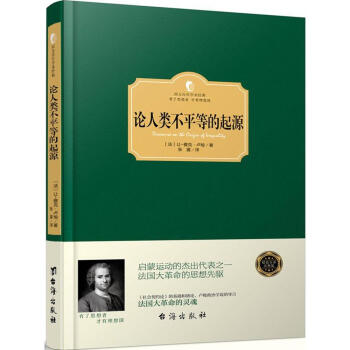


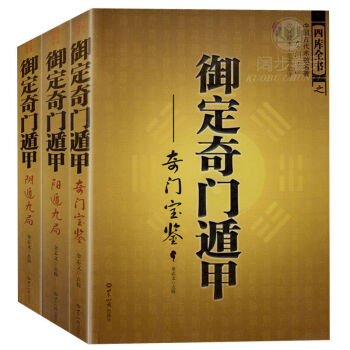
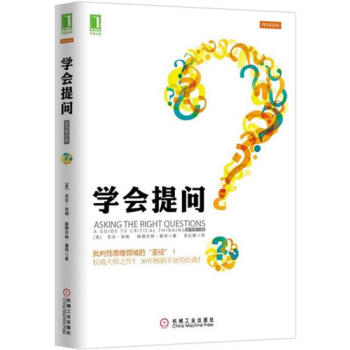
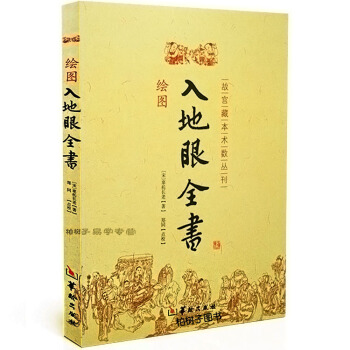
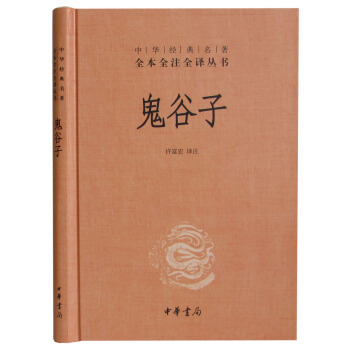
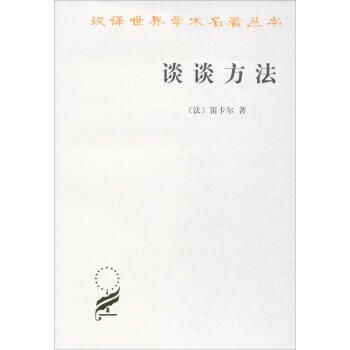
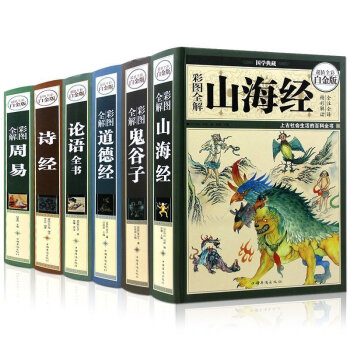
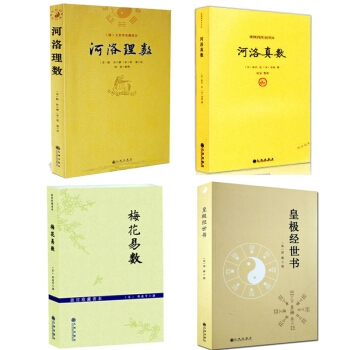



![咖啡與哲學:對話體哲學導論 [Coffee and Philosophy:A Conversational Introduction to Philosophy with Readings] pdf epub mobi 電子書 下載](https://pic.windowsfront.com/10075700/4970ee33-a7e2-484a-9d31-de5afcfda0a8.jpg)
